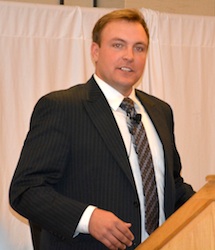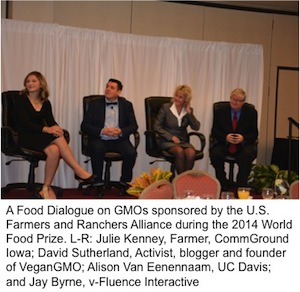What do you know about GMOs? Most people not much with the exception that many have been led to believe they are bad. In a recent Jimmy Kimmel Live, Jimmy Kimmel, he took to the streets to ask people what a GMO was and not one person knew, even thought most b elieved they were bad. In case you don’t know, its a “genetically modified organism” or in the words of 2014 Borlaug CAST Communication Award winner Dr. Alison Van Eenennaam, it means genetically engineered.
elieved they were bad. In case you don’t know, its a “genetically modified organism” or in the words of 2014 Borlaug CAST Communication Award winner Dr. Alison Van Eenennaam, it means genetically engineered.
Because GMO’s are such a misunderstood technology and a hot topic the U.S. Ranchers & Farmers Alliance (USFRA) hosted a Food Dialogue event in conjunction with CAST and the World Food Prize. “GMOs and the Consumer Mindset: Does Perception and Marketing Outweigh Science?” was moderated by Mike Pearson, host of Market to Market on Iowa Public Television. Panelists included Julie Kenney, farmer and CommonGround volunteer; David Sutherland, activist, blogger and founder of VeganGMO; Dr. Alison Van Eenennaam, University of California-Davis, department of Animal Science; and Jay Byrne, president v-Fluence Interactive.
The dialogue focused on two main topics: what consumers believe about GMOs and how to get the facts into the conversation and more specifically how to get scientists, like Van Eenannaam, more involved in the conversation.
One issue that all the panelists noted was that in the debate, the “experts” have no expertise. They are anti-GMO advocates from various walks of life who have self-proclaimed themselves experts but don’t understand the data or more specifically refuse to acknowledge the data. And what is unnerving, explained Byrne, is that people who are reading about GMOs are taking the word of these experts including high profile media such as Dr. Oz, host of the Dr. Oz Show.
Speaking of media, all the panelists agreed that the media were in part to blame for the mis-information being pro pagated about GMOs. They don’t do their research and they don’t understand science. Sutherland noted that the story of GMOs being fine “is not sexy” and thus is ignored.
pagated about GMOs. They don’t do their research and they don’t understand science. Sutherland noted that the story of GMOs being fine “is not sexy” and thus is ignored.
Kenney added that when speaking to “mom bloggers” when they come to the farm they had the view that GMOs were bad but after seeing firsthand how food was made, many of them became “conflicted” as to which message was the truth.
Sutherland, Byrne and Kenney all stressed that in their roles, the people they are speaking with have no science-based facts and stressed the need for more scientists to speak out. However, Van Eenennaam said that its hard to scientists to speak out when they are attacked and many have difficulty discussing their research in ways consumers can understand.
Yet despite these challenges, Byrne said that this debate will run its course and if the facts continue to be presented by respected people, such as the work Kenney is doing with CommonGround and the work Van Eenennaam is doing on behalf of the scientific community, GMOs will ultimately become accepted and no longer a front line issue.
